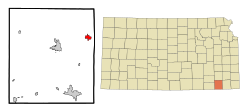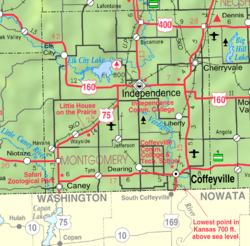Cherryvale, Kansas
Cherryvale is a city in Montgomery County, Kansas, United States.[4] In 2020, 2,192 people lived there.[3]
 | |
 Location within Montgomery County and Kansas | |
 | |
| Coordinates: 37°16′08″N 95°33′13″W / 37.26889°N 95.55361°WCoordinates: 37°16′08″N 95°33′13″W / 37.26889°N 95.55361°W[1] | |
| Country | United States |
| State | Kansas |
| County | Montgomery |
| Founded | 1871 |
| Platted | 1871 |
| Incorporated | 1880 |
| Named for | Cherry Creek valley |
| Area | |
| • Total | 2.03 sq mi (5.25 km2) |
| • Land | 2.00 sq mi (5.19 km2) |
| • Water | 0.02 sq mi (0.06 km2) |
| Elevation | 830 ft (250 m) |
| Population | |
| • Total | 2,192 |
| • Density | 1,079.8/sq mi (417.5/km2) |
| Time zone | UTC-6 (CST) |
| • Summer (DST) | UTC-5 (CDT) |
| ZIP code | 67335 |
| FIPS code | 20-12925 |
| GNIS ID | 485553[1] |
| Website | cherryvaleusa.com |
History
Cherryvale was created on the land of the Osage Indians. The Osage had to leave because veterans of the American Civil War were looking for land. The first white man to buy land and settle in Cherryvale was Mr. Abe Eaton. He later sold his land to the Kansas City, Lawrence & Southern Kansas Railroad. That railroad became the Leavenworth, Lawrence & Galveston Railway. It then became the Atchison, Topeka and Santa Fe Railway, which used the line for much of the 20th century. The town site was platted by the railroad in 1871.[5] It was named Cherryvale because of its place in the valley of Cherry Creek.[6]
Between 1871 and 1873, at least eleven people disappeared in an inn and general store operated by the Bender family. It was about eight miles (13 km) northeast of Cherryvale. After the Benders disappeared in 1873, it was found that they had killed many travelers. Between eight and eleven bodies were found buried in the area. Governor Thomas A. Osborn offered a reward of $2,000 for anyone who could find and catch the Benders, but they were never found.[7][8]
The main part of the town was destroyed by fire in 1873, but was soon rebuilt. In 1880, Cherryvale became was incorporated. Natural gas was found here in 1889. Oil was found several years later.[4]
Geography
Cherryvale is at 37°16′5″N 95°33′3″W / 37.26806°N 95.55083°W (37.268010, -95.550778).[9] The United States Census Bureau says that the city has a total area of 2.03 square miles (5.26 km2). Of that, 2.00 square miles (5.18 km2) is land and 0.02 square miles (0.05 km2) is water.[2] Is self-described as the "Gateway to Big Hill Lake."
Climate
Cherryvale has hot, humid summers and generally mild to cool winters. The Köppen Climate Classification system says that Cherryvale has a humid subtropical climate, abbreviated "Cfa" on climate maps.[10]
People
| Historical populations | |||
|---|---|---|---|
| Census | Pop. | %± | |
| 1880 | 690 | ||
| 1890 | 2,104 | 204.9% | |
| 1900 | 3,472 | 65.0% | |
| 1910 | 4,304 | 24.0% | |
| 1920 | 4,698 | 9.2% | |
| 1930 | 4,251 | −9.5% | |
| 1940 | 3,185 | −25.1% | |
| 1950 | 2,952 | −7.3% | |
| 1960 | 2,783 | −5.7% | |
| 1970 | 2,609 | −6.3% | |
| 1980 | 2,769 | 6.1% | |
| 1990 | 2,464 | −11.0% | |
| 2000 | 2,386 | −3.2% | |
| 2010 | 2,367 | −0.8% | |
| U.S. Decennial Census | |||
2020 census
The 2020 census says that there were 2,192 people, 874 households, and 543 families living in Cherryvale. Of the households, 68.9% owned their home and 31.1% rented their home.
The median age was 39.3 years. Of the people, 87.2% were White, 1.4% were Native American, 0.9% were Black, 0.2% were Asian, 1.0% were from some other race, and 9.3% were two or more races. Hispanic or Latino of any race were 5.3% of the people.[3][11]
2010 census
The 2010 census says that there were 2,367 people, 930 households, and 615 families living in Cherryvale.[12]
Famous people

- Sam Avey, wrestling promoter
- Frank Bellamy (1876–1915), contested author of the Pledge of Allegiance[13][14][15][16]
- Louise Brooks, dancer, silent film star, and author
- Claude Wendell Horton, Sr., geophysicist, acoustic researcher
- Billy Sandow, manager for World Champion Ed "Strangler" Lewis
- Vivian Vance, actress who played Ethel Mertz on I Love Lucy
References
- ↑ 1.0 1.1 1.2 U.S. Geological Survey Geographic Names Information System: Cherryvale, Kansas
- ↑ 2.0 2.1 "2020 U.S. Gazetteer Files". United States Census Bureau. Retrieved November 30, 2023.
- ↑ 3.0 3.1 3.2 "DP1: PROFILE OF GENERAL POPULATION AND HOUSING CHARACTERISTICS". United States Census Bureau. Retrieved November 30, 2023.
- ↑ 4.0 4.1
 Chisholm, Hugh, ed. (1911). . Encyclopædia Britannica. Vol. 6 (Eleventh ed.). Cambridge University Press. p. 85.
Chisholm, Hugh, ed. (1911). . Encyclopædia Britannica. Vol. 6 (Eleventh ed.). Cambridge University Press. p. 85. {{cite encyclopedia}}: Cite has empty unknown parameter:|coauthors=(help) - ↑ Blackmar, Frank Wilson (1912). Kansas: A Cyclopedia of State History, Embracing Events, Institutions, Industries, Counties, Cities, Towns, Prominent Persons, Etc. Standard Publishing Company. p. 323. ISBN 9780722249055.
- ↑ Kansas State Historical Society (1916). Biennial Report of the Board of Directors of the Kansas State Historical Society. Kansas State Printing Plant. p. 243.
- ↑ "Bender Knife". Kansas Historical Society. Retrieved May 6, 2016.
- ↑ Potter, Tim. "The Bloody Benders: 140-year-old crime scene still fascinates today". Wichita Eagle. August 24, 2013. Retrieved May 6, 2016.
- ↑ "US Gazetteer files: 2010, 2000, and 1990". United States Census Bureau. 2011-02-12. Retrieved 2011-04-23.
- ↑ Climate Summary for Cherryvale, Kansas
- ↑ "P16: HOUSEHOLD TYPE". United States Census Bureau. Retrieved December 30, 2023.
- ↑ "American FactFinder". United States Census Bureau. Retrieved 2012-07-06.
- ↑ "Frank E. Bellamy 1876-1915". Archived from the original on 2019-08-14. Retrieved 2019-11-22.
- ↑ Case for the Pledge of Allegiance; Kansas Historical Society
- ↑ "Joyce Long is debating history"; The Morning Sun; July 8, 2012.
- ↑ "A Kansas Schoolboy Wrote Our Pledge of Loyalty to the Flag"; Kansas City Star; April 1917.
Other websites
| Wikimedia Commons has media related to Lua error in Module:Commons_link at line 62: attempt to index field 'wikibase' (a nil value).. |
- City
- Schools
- USD 447, local school district
- Historical
- Cherryvale Museum Archived 2019-09-15 at the Wayback Machine
- Cherryvale History
- Historic Images of Cherryvale, Special Photo Collections at Wichita State University Library
- Maps
- Cherryvale City Map Archived 2020-05-04 at the Wayback Machine, KDOT